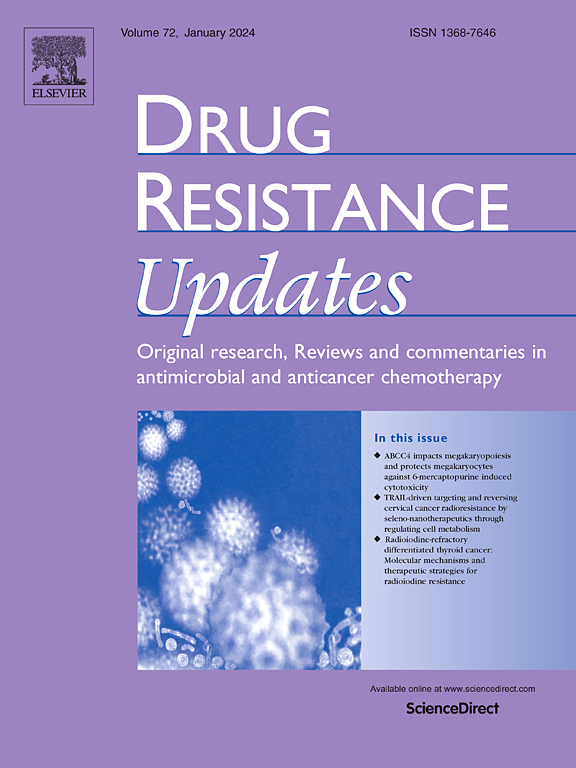Lactylation in cancer progression and drug resistance
IF 15.8
1区 医学
Q1 PHARMACOLOGY & PHARMACY
引用次数: 0
Abstract
Lactate plays a crucial role as an energy substrate, metabolite, and signaling molecule in cancer. Lactate has long been considered a byproduct of glycolysis. Still, the lactate shuttle hypothesis has changed the lactate paradigm, revealing the implications of lactate in cellular metabolism and cellular communications that can transcend the compartment barrier and occur within and between different cells, tissues, and organs. Due to the Warburg effect, the tumor produces a large amount of lactate, thus creating a low-nutrition, hypoxic, and low-pH tumor microenvironment (TME). Consequently, immunosuppressive networks are built to acquire immune evasion potential and regulate tumor growth. Lactylation is a newly discovered post-translational modification of lysine residues with the capacity for transcriptional regulation via histone modification and modulation of non-histone protein functions, which links gene regulation to cellular metabolism by aberrant metabolism activity and epigenetic modification. There is growing evidence that lactylation plays a crucial role in cancer progression and drug resistance. Targeting lactylation enzymes or metabolic pathways has shown promising effects in suppressing cancer progression and drug resistance, highlighting the therapeutic potential of this modification. Therefore, in this review, we offer a systematic overview of lactate homeostasis in physiological and pathological processes as well as discuss the influence of lactylation in cancer progression and drug resistance and underlying molecular mechanisms, providing a theoretical basis for further research.
肿瘤进展和耐药中的乳酸化作用
乳酸作为一种能量底物、代谢物和信号分子在癌症中起着至关重要的作用。乳酸一直被认为是糖酵解的副产物。尽管如此,乳酸穿梭假说已经改变了乳酸范式,揭示了乳酸在细胞代谢和细胞通讯中的含义,这些细胞代谢和细胞通讯可以超越隔室屏障,发生在不同细胞、组织和器官内部和之间。由于Warburg效应,肿瘤产生大量乳酸,从而形成低营养、缺氧、低ph的肿瘤微环境(TME)。因此,免疫抑制网络被建立以获得免疫逃避潜能和调节肿瘤生长。乳酸酰化是新近发现的赖氨酸残基的翻译后修饰,具有通过组蛋白修饰和非组蛋白功能调节转录的能力,通过异常代谢活性和表观遗传修饰将基因调控与细胞代谢联系起来。越来越多的证据表明,乳酸化在癌症进展和耐药性中起着至关重要的作用。靶向乳酸化酶或代谢途径在抑制癌症进展和耐药方面显示出良好的效果,突出了这种修饰的治疗潜力。因此,在本文中,我们将系统地综述乳酸在肿瘤生理和病理过程中的稳态,并讨论乳酸化在肿瘤进展和耐药中的影响及其分子机制,为进一步研究提供理论基础。
本文章由计算机程序翻译,如有差异,请以英文原文为准。
求助全文
约1分钟内获得全文
求助全文
来源期刊

Drug Resistance Updates
医学-药学
CiteScore
26.20
自引率
11.90%
发文量
32
审稿时长
29 days
期刊介绍:
Drug Resistance Updates serves as a platform for publishing original research, commentary, and expert reviews on significant advancements in drug resistance related to infectious diseases and cancer. It encompasses diverse disciplines such as molecular biology, biochemistry, cell biology, pharmacology, microbiology, preclinical therapeutics, oncology, and clinical medicine. The journal addresses both basic research and clinical aspects of drug resistance, providing insights into novel drugs and strategies to overcome resistance. Original research articles are welcomed, and review articles are authored by leaders in the field by invitation.
Articles are written by leaders in the field, in response to an invitation from the Editors, and are peer-reviewed prior to publication. Articles are clear, readable, and up-to-date, suitable for a multidisciplinary readership and include schematic diagrams and other illustrations conveying the major points of the article. The goal is to highlight recent areas of growth and put them in perspective.
*Expert reviews in clinical and basic drug resistance research in oncology and infectious disease
*Describes emerging technologies and therapies, particularly those that overcome drug resistance
*Emphasises common themes in microbial and cancer research
 求助内容:
求助内容: 应助结果提醒方式:
应助结果提醒方式:


